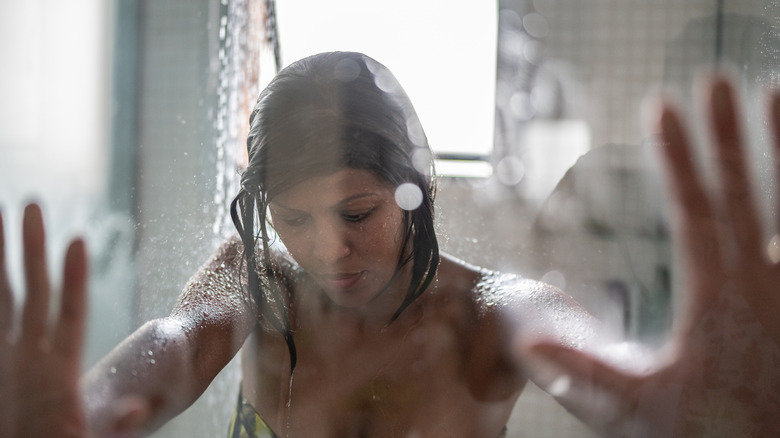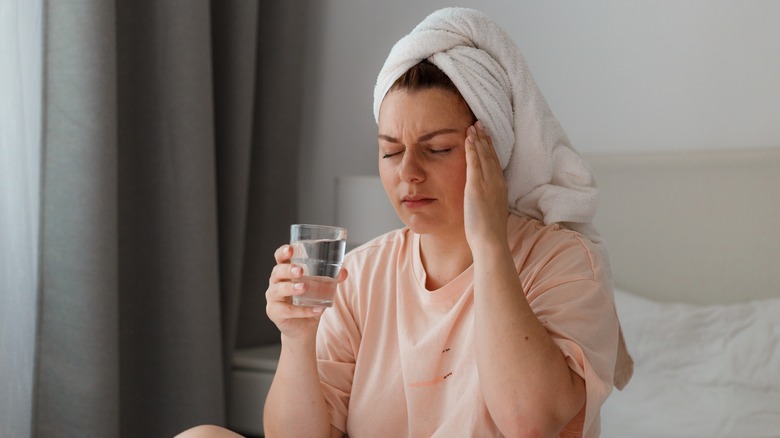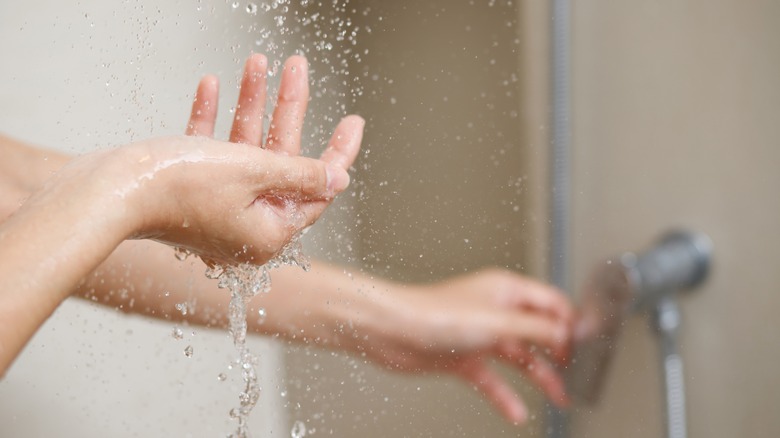Here's Why You Are Getting Dizzy And Nauseous In The Shower
An upside-down roller coaster, illness, or even a panic attack are all things that can prompt a bout of dizziness or nausea. Sometimes, however, one may feel dizzy or nauseous in response to triggers that may seem a little more strange, such as a relaxing shower.
First, a few quick facts. Nausea is characterized by a queasy feeling in the stomach and the need to throw up, although vomiting may not always occur. Those who experience dizziness may feel wobbly, faint, or woozy. While they may share some overlap in symptoms, dizziness is not the same as lightheadedness.
If you're someone who hops in the shower only to be struck by a wave of unwelcome nausea and dizziness, there may be a number of things going on. While not always cause for concern, there are some cases in which these symptoms may be tied to a health condition. Here's what you can do to reduce shower-related nausea and dizziness and when you should consider speaking with your physician.
Changes in blood pressure
More often than not, dizziness and nausea that comes on during a shower is linked with blood pressure. Dr. Joshua Hoffman, the medical director of Sutter Medical Group Hospitalist Program in California, further explains via YouMeMindBody, stating, "[B]athing or showering causes blood vessels to dilate and triggers a drop in blood pressure. If you move too quickly, your brain may not get enough oxygen, making you feel light-headed and dizzy."
Also linked with blood pressure, dizziness and nausea are two of many symptoms that can indicate progressive heart failure. For this reason, experts at Southern Texas Health System advise sticking with warm shower water that does not exceed the body's temperature, as hotter water can trigger dizziness for these individuals.
Alternatively, general practitioner and family physician at Alberta Health Services, Dr. Etinosa Ogbebor, writes via Loo Academy that a person may also feel dizzy or the urge to vomit following a shower if their blood sugar is low, if they have had a recent change in medication, or if they are dehydrated. These sensations are also not uncommon during pregnancy if you are exposed to abrupt changes in temperature, such as when showering with hot water.
Tips for making your showers safer
On the other hand, younger folks who feel dizzy or nauseous when showering may be experiencing what's known as vasovagal syncope (via YouMeMindBody). When the body undergoes a rapid increase in temperature, our blood vessels dilate and subsequently reduce blood flow between the heart and the brain. This impacts our blood pressure, and the result can be dizziness, nausea, or fainting.
To help reduce the discomfort of nausea and dizziness during a shower, as well as the risk of related falls, make sure you're drinking plenty of liquids throughout the day. Additionally, turn down the temperature of the water and be sure to sit down if you begin to feel dizzy or nauseous. Always wait until you feel steady before getting up again. Additionally, try boosting your blood sugar by eating a little something and drinking a glass of water before bathing (per Loo Academy). Keep your showers short and sweet if there's a chance you may be pregnant, and stick to mildly warm water if you're starting a new prescription. Speak to your doctor if you suspect these symptoms may be related to a health condition.



